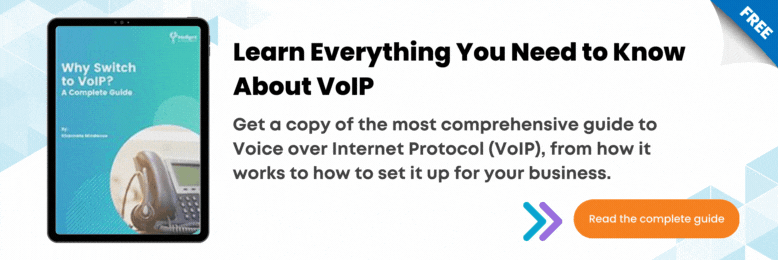6 Things to Check Before Signing a Long-Term VoIP Contract
March 6th, 2024 | 5 min. read

Communication is one of the most critical aspects of every business infrastructure. Whether you are connecting with team members, clients, or customers, your channels must always be reliable and effective.
Voice over Internet Protocol (VoIP) has revolutionized how businesses communicate, serving as a cost-effective way to enhance functionality. You have likely heard of this technology and are considering riding the trend to seek good returns and optimize your operations.
However, before you finalize any deal, you must perform due diligence to guarantee that this long-term investment will bear returns and align seamlessly with your business goals.
For expert insight, we spoke with Brian Kaminsky, Intelligent Technical Solutions (ITS) partner and outside sales consultant in charge of all things VoIP. He has designed and deployed many VoIP systems and handled many VoIP deals, giving him technical and functional knowledge of the service.
In this article, we will go over three things:
- How long VoIP contracts last, and why;
- The six things to check before signing a contract; and
- Who needs VoIP services
As a managed IT service provider (MSP), we find it our responsibility to help you land an honest contract – not necessarily with us but with an MSP of your choosing – that will help you leverage VoIP technology while safeguarding your bottom line.
How long do VoIP contracts last (and why)?

Long-term VoIP contracts that last between one to three years are standard in the industry. Several things like cost, setup requirements, and client-provider relations justify such lengths.
Setting up a VoIP phone system requires a lot of resources, which your MSP initially shoulders. These long contracts allow MSPs to recoup initial investments in equipment and infrastructure.
Another reason VoIP contracts last for years is to establish solid client-provider relations at the start. Kaminsky said, “Everybody wants to feel like they are part of a team. We all want to feel like we are invested in each other. Commitments and contracts typically help us to feel that way.”
Even with these reasons, you might still find it difficult to commit. Nobody wants to feel held down or trapped. You can turn those emotions into confidence by thoroughly going through your agreement, and that is what we will discuss next.
6 Things to Check Before Signing a VoIP Contract
Here are six things you should check before signing a long-term VoIP contract with your MSP:
1. Existing contract status
If you’re currently partnering with a different VoIP provider or MSP, you must check your existing contract because you may end up paying double when you don’t have to.
First, look at the status of your existing contract. If it’s about to end, it would be better to let it run its course before signing with a new provider.
However, if you have a few more years in it, you must decide between paying costly cancellation fees, sticking it out, or asking your new provider for a buyout.
Buyouts happen, but they must make sense. You and your new MSP should see significant benefits in forming a partnership. Switching IT service providers is a serious decision, so you must be 100% sure before pushing through.
2. Service cost and features
As with any service, knowing and understanding what you are getting and at what cost is essential. VoIP costs vary per provider and usually depend on user count, equipment cost, installation fees, and service features.
There is a lot you can choose from, including fax services, integrated dashboards, and improved voicemail and calling functions.
As for the specifics, we can only speak for ourselves as each MSP serves a different plan. ITS offers a 3CX VoIP solution, typically costing $25 to $35 per user monthly.
3. VoIP continuity plans
One thing that worries most clients is the consequence of their internet going down and taking their new VoIP system down with it. The loss of this critical business function can negatively impact service quality, customer loyalty, and overall revenue.
So, ensure your MSP has a clear continuity plan for your VoIP phone system.
There are many ways your MSP can go about this. Some possible solutions are to set up a backup internet, which will kick in once your primary connection goes down, and another is to reroute calls and mail to a regular cellphone.
4. Implementation process
Another thing you should be concerned about is how your MSP is going to set up your new VoIP phone system. What equipment are they going to retain or replace? How long will the process take? Is it going to affect your business operations?
Depending on the size of your business, ITS can have everything up and running within five to six weeks. We will start with a network assessment, understand your needs, address your concerns, set things up, and start the switch. In short, we guarantee a smooth transition.
According to Kaminsky, once everything is set up, “I'd say we've gotten to the part where we're well-versed on these implementations. And we're very competent. So, we have these [transfers] down in maybe 10 to 15 minutes with no downtime.”
5. Cancellation policy
VoIP contracts are long-term and hard to get out of. Since there's a large initial investment on the side of the MSP, they will only let you leave if you pay a hefty termination fee. And that's where the feeling of being trapped and tied down comes from.
However, ITS does things differently.
We have a 30-day money-back guarantee. If you are unhappy with our service, we have 30 days to correct our actions and get your approval. If we cannot satisfy your needs, we will let you out of the agreement free of charge. And we offer guidance even beyond that.
“One of the ITS core values is to do the right thing,” Kaminsky said. “That right thing may involve talking to a new provider and making it easy for them to port their numbers out. We make it so that we have a clear, concise timeline like we do with any client.”
“I say the beginning of a relationship says a lot, but the end of a relationship says a lot as well,” he added.
6. The fine print
Finally, check the fine print on your VoIP contract as much as you would for any other service like cybersecurity and compliance. MSPs can sneak in strict provisions that could trap you into their service.
We asked Kaminsky about common clauses hidden in fine print, and he answered with auto-renewal clauses, termination fees, quality of service guarantees, and restrictions such as porting away your phone numbers.
We at ITS don’t subscribe to this practice. As Kaminsky said, “We make it very clear. Everything on that contract is right there.”
Who needs VoIP services?

At the end of the day, you really need to know whether you need a VoIP system for your business. VoIP offers several benefits, and you must be able to take advantage of all of them to get your investment’s worth.
"I think it's perfect for a service business and any business with employees everywhere. I think it's a perfect solution for them,” answered Kaminsky when asked which business is perfect for VoIP.
He also believes VoIP benefits all businesses by offering cost savings, flexibility, and scalability. It all comes down to knowing and addressing your needs rather than overbuying the service.
RELATED: What IT solutions do your business need and not need? [FREE TOOL]
Get VoIP Services from a Trusted MSP

Finding the perfect balance between leveraging technology and making a worthwhile investment is challenging. So, before signing off on a VoIP contract, review every detail of the agreement and ensure it perfectly fits your goals and needs.
By carefully assessing your needs, vetting potential partners, and ensuring the terms align with your goals, you are guaranteed to make the right decision for your business.
ITS is a managed IT service provider (MSP) that offers VoIP services to small and medium-sized businesses in the United States. If you’re interested in our service, schedule a meeting to find out how we can help your business.
You can also check out our complete guide on VoIP to learn everything you need to know about the service.
We have more VoIP-related content on our Learning Center that you can check out:
Mark Sheldon Villanueva has over a decade of experience creating engaging content for companies based in Asia, Australia and North America. He has produced all manner of creative content for small local businesses and large multinational corporations that span a wide variety of industries. Mark also used to work as a content team leader for an award-winning digital marketing agency based in Singapore.
Topics:

